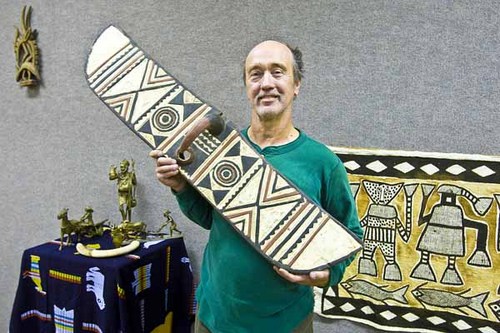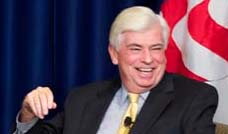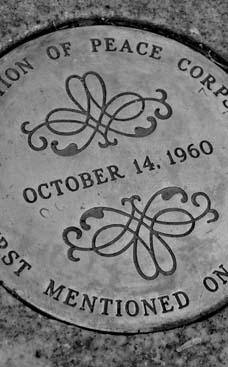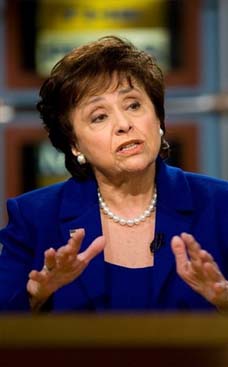
"I worked there for two years as an animal traction trainer and advisor," he explained. "I trained oxen, and I trained people to train oxen to pull plows and carts. It was one of the funnest jobs I've had in my life. My brother was in 4-H and used to show beef at the Clay County Fair, so I was used to working around animals, training them to be calm. It was a natural thing for me." After that first Peace Corps stint, H returned home and renewed his friendship with Joanne, whom he knew from junior high. "After about a year of marriage, we went into the Peace Corps, this time as a couple, to Zaire, which has changed its name as well," he said. "It's now the Congo. We were there for another two years, then went back to the U.S. and I went to grad school at Purdue. They had a program specially aimed at Peace Corps volunteers - an agricultural economics degree with a developmental orientation toward Africa. That fit my profile and ambition perfectly."
RPCV H Schar collects are from Africa
Everyday Art: Schars share their unique collection of African artifacts
By: Beth Rickers, Worthington Daily Globe
Caption: H Schar holds a butterfly dance mask from his time spent in Africa. His collection of artifacts is on display at the Nobles County Art Center.
WORTHINGTON - Wayfarers who make the short journey down the stairs to the Nobles County Art Center will find themselves transported to another continent through a unique collection of "Everyday Art" - items collected over 30 years spent living and working in Africa.
The collectors are H (yes, that's his full name) and Joanne Schar of Spencer, Iowa, who share wanderlust and an appreciation for beautiful handmade items. They both grew up in Spencer and have continued to make the northwest Iowa city their home base throughout their travels.
"My mother was a schoolteacher, and my brother and I, from the time we were small, were fascinated by geography," explained H as he lovingly placed pieces from his collection in the gallery earlier this week. "She'd put up the latest National Geographic map on the wall, and we'd sit and look at it while we were eating our cereal or whatever. So I got the itch to see the world at an early age."
After earning a bachelor's degree at Augustana College, H entered the Peace Corps and was assigned to the small African country of Dahomey, now called Benin.
"I worked there for two years as an animal traction trainer and advisor," he explained. "I trained oxen, and I trained people to train oxen to pull plows and carts. It was one of the funnest jobs I've had in my life. My brother was in 4-H and used to show beef at the Clay County Fair, so I was used to working around animals, training them to be calm. It was a natural thing for me."
After that first Peace Corps stint, H returned home and renewed his friendship with Joanne, whom he knew from junior high.
"After about a year of marriage, we went into the Peace Corps, this time as a couple, to Zaire, which has changed its name as well," he said. "It's now the Congo. We were there for another two years, then went back to the U.S. and I went to grad school at Purdue. They had a program specially aimed at Peace Corps volunteers - an agricultural economics degree with a developmental orientation toward Africa. That fit my profile and ambition perfectly."
Now retired, H spent 30 years as a professional economist, largely working and living in various African countries.
"We lived in six countries," he noted. "Our daughter was born in Cameroon, our son spent his first two years in Burkina Faso. They were all assignments of two to four years. I also worked in about 25 countries in Africa - about half the countries in Africa - as a short-time consultant on all kinds of projects, analyst-advisor type things."
As they lived and traversed through Africa, H and Joanne found themselves accumulating pieces of African handiwork.
"You buy a few souvenirs here and there, and by the time 30 years have passed, you have quite a few souvenirs," said H with a laugh. "They're not particularly valuable in terms of antiquities - although a few do have some monetary value - but they mostly have value as souvenirs, sentimental value.
"The main perspective we're trying to get across in the exhibit is everything we purchased is something that would have been used in the course of daily life in Africa," H continued. "I was charmed by the ability of the Africans, despite their crushing poverty, their ability to make their ordinary things beautiful."
Because they picked up whatever suited their fancy, the Schars' collection is quite eclectic, although there are several specific areas of concentration.
"I personally have two types of things that I liked to collect," H noted. "Textiles are one of my principle fascinations - the whole process of spinning, weaving, dyeing and making the fabric into something. And then I also have a small collection of brass gold weights and pre-colonial monetary items. As an economist, these things interest me. They were used as items of exchange before the Europeans came."
The weights are small brass items, fashioned in either geometric or anthropomorphic designs, equaling a certain weight in gold. They would be utilized as a counterweight when gold was measured on a scale.
"The monetary items are from before the Europeans came," H explained. "There was significant intracontinental trading, and they were mediums of exchange. Cowry shells would be smallest, all the way up to manilas, which are heavy pieces of brass. They look like bracelets but were not used as bracelets. In the Congo, they also used crosses that were made out of brass, and I have a couple examples of those."
H also collected some knives and other tools and weaponry, while Joanne gravitated toward woven items, baskets in particular.
One of the more intriguing pieces in the Schar collection is a reliquary statue, an item that would have placed a "significant role" in a local religion.
"Most Africans are monotheistic," H explained, pointing out the statue. "They believe in one God. But they believe God intervenes in normal life through intermediaries, and family is extremely important. They view family as a continuum, from the ancestors through the yet-to-be-born, and the ancestors can intercede in the life of the living, for good or ill. So most people have relics of their ancestors, maybe even a bone or a skull, which they keep in a niche in their home. And they would have something like this made to protect the relics and the house. It represents the energy of the ancestors.
"Africans have a very complicated cosmology, a spiritual way of looking at the world."
Another of H's favorite pieces is a dowry symbol from the upper Congo - a metal, spear-like object on the end of a rod.
"It would be offered by the family of the groom to the family of the woman he would be choosing as a promise that he would provide a good life for her," he said. "It could be interpreted as both a spear or a hoe."
In their home in Spencer, the Schars surround themselves with these things that remind them of Africa, and they took them right off the wall for the Worthington exhibit.
"It makes me feel comfortable," said H about the décor in their home. "I often say I feel more comfortable getting off a plane in Ouagadougou (in Burkina Faso) than at O'Hare Airport in Chicago.
"But we're also glad to share it. There's a story to all this stuff."
The opening reception for "Everyday Art" will be from 2 to 4 p.m. Sunday at the Nobles County Art Center, located in the lower level of the War Memorial Building (Nobles County Library), 407 12th St., Worthington. The exhibit will continue through Nov. 30. Hours are 2 to 4:30 p.m. Monday through Friday. For more information, phone 372-8245.













